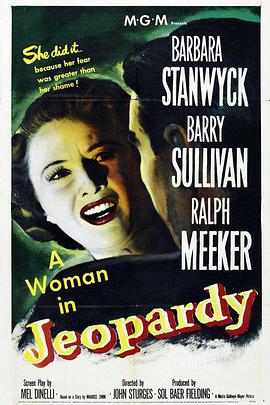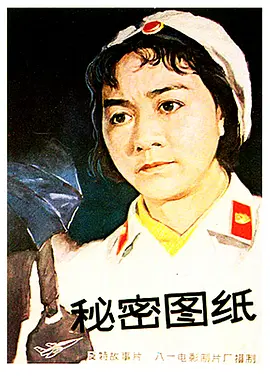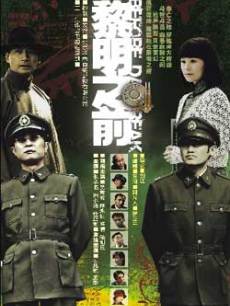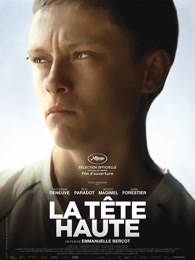年份:1953 类型:剧情片
主演:芭芭拉·斯坦威克,巴瑞·萨里万,拉尔夫·米克
导演:约翰·斯特奇斯
地区:美国
语言:英语
剧情简介
来自 IMDB:强硬、性格内向的城市警察吉姆威尔逊粗暴对待太多嫌疑人,并派出上州帮助调查谋杀案……
Nicholas Ray and Samuel Fuller, two American moviemakers extraordinaire, were born one year part, both lauded for their distinctive styles, here they offer two ‘50s film-noir features, both concern themselves with a hardboiled male protagonist, whose dismal world-view is softened by a good-hearted female character, but their attitudes couldn’t be more divergent.
In Ray’s ON DANGEROUS GROUND, Robert Ryan plays a tough city cop Jim Wilson, unlike his colleagues, he is a loner, case-hardened by the seedy milieu and seamy riffraff he encounters daily, his occupational hazard begins to tell, as he is more than willing to enforce violence upon those who doesn’t cooperate (suspects and witnesses alike).
Relegated by his superior to investigate an up-state murder case, Jim takes the talking-to with a sneer, but his callous carapace begins to thaw out by Mary Malden (Lupino), the blind sister of the unbalanced offender Danny (Williams). He promises her he will do all in his power to safeguard Danny’s safety (who should be warehoused), while the victim’s grieving father Walter Brent (Bond) bays for blood.
Whether it is a futile promise or not, Jim is impressed by Mary’s poised phlegm and unbowed strength, which awakes his compassion and makes him whole again, a happy ending is hammered out, but not before both are given some headspace in the aftermath. Ray and screenwriter Bezzerides’ straightforward moral lesson is a tad oversimple but Ryan sports the distinction of being a lodestone of masculine gallantry, and Lupino is an exemplar of fortitude and grace, who also pluckily takes the directorial chair when Ray is stricken with a malady.
If Ray’s film is a handsome-made, conventional studio fare from the Hollywood assembly which is adequately instructive (e.g. the film is very prescient to flag up police brutality), Fuller’s PICKUP ON SOUTH STREET is far more ebullient and impudent, physical violence erupts at the drop of a hot (don’t blink when women get shot and battered).
Lumping a pickpocket, a stool pigeon, a girl with a questionable past, some commies and red-baiting from the law enforcement into a scramble, this cat-and-mouse game of obtaining a microfilm is a slap on the face of blind patriotism. Skip McCoy (Widmark), an ex-con and hardened pickpocket, is not going to give away the said film he pilfers from Candy (Peters) on the metro simply because it is a treason if he refuses to do so, not if he can exact a handsome payoff from the valuable. No police sweet-talk or coercing can persuade him. He even scoffs at the promise of clean slate from the police captain Dan Tiger (Vye, who look comically miffed and cannot suffer lowlife gladly).
A weasel-faced Widmark has just the right attributes to make Skip a deadbeat hero, he has nothing to lose, doesn’t even live a semblance of a life, he is one cool desperado who doesn’t care about his own life. He is the obverse of Ryan’s toughie Wilson since they belong to the opposites of the law, yet, both are consumed by lonesomeness and cynicism. Here, it is Candy’s unusual fidelity that delivers Skip from his status quo, their growing romance doesn’t have a solid ground, but one can see that Fuller, in spite of the violent, macho world he constructs, is profoundly a sentimentalist, Skip and Candy share that “made-for-each-other” vibe, they are cut from the same cloth and once their paths are crossed, it is only natural they stick together and canoodle whenever they feel like to. Peters really endeavors to deliver Candy’s transition as smooth and persuasive as possible, her voluptuousness is a vulgar one, but that doesn’t cheapen Candy’s heroic act, in a sense, she is the true agency in the movie by demonstrating her affection and loyalty unyieldingly.
There is honor among thieves, even for Moe (Ritter), the wiseacre stoolie (her way of doing business with Captain Tiger is the comic relief the movie is hurt for), she earns her living (and preparing for her death) candidly, no bad blood between her and Skip, and she is more than befuddled when Candy knocks on her door and overshares her feelings.
Ritter is meritoriously nominated for an Oscar on the strength of her impactful impersonation, Moe’s world-weariness is so infectious even though we don’t want to credit it, we cannot help imagining the worst. Moe’s fate also points up how the anti-Red brainwash works (or any kind of brainwash), she is indoctrinated to dislike something she doesn’t even know of, and is killed because of that benightedness, Fuller always knows his way of sending his veiled message.
Both Ray and Fuller show their dab hands, ON DANGEROUS GROUND has several widely impressive landscape compositions while PICKUP ON SOUTH STREET is adept at zooming in on the pickpocketing close-ups with rapid editing to simulate veracity. But both films are tainted by its stock designation of characters of both genders, but Fuller’s work leaves more reverberations and betrays his maverick perspicacity.
referential entries: Ray’s THEY LIVE BY NIGHT (1948, 7.1/10); Fuller’s THE NAKED KISS (1964, 7.5/10), UNDERWORLD U.S.A. (1961, 6.7/10); Max Ophüls’ CAUGHT (1949, 7.7/10).
Title: On Dangerous GroundYear: 1951Country: USALanguage: EnglishGenre: Drama, Film-NoirDirector: Nicholas RayScreenwriter: A.I. Bezzeridesbased on the novel by Gerald ButlerMusic: Bernard HerrmannCinematography: George E. DiskantEditing: Roland GrossCast:Robert RyanIda LupinoWard BondsAnthony RossCharles KemperEd BegleySumner WilliamsRichard IrvingCleo MooreIan WolfeRating: 6.8/10Title: Pickup on South StreetYear: 1953Country: USALanguage: EnglishGenre: Crime, Film-Noir, ThrillerDirector/Screenwriter: Samuel Fullerfrom a story by Dwight TaylorMusic: Leigh HarlineCinematography: Joseph MacDonaldEditing: Nick DeMaggioCast:Richard WidmarkJean PetersThelma RitterRichard KileyMurvyn VyeWillis BoucheyMilburn StoneVic PerryRating: 7.5/10
{if:"
Nicholas Ray and Samuel Fuller, two American moviemakers extraordinaire, were born one year part, both lauded for their distinctive styles, here they offer two ‘50s film-noir features, both concern themselves with a hardboiled male protagonist, whose dismal world-view is softened by a good-hearted female character, but their attitudes couldn’t be more divergent.
In Ray’s ON DANGEROUS GROUND, Robert Ryan plays a tough city cop Jim Wilson, unlike his colleagues, he is a loner, case-hardened by the seedy milieu and seamy riffraff he encounters daily, his occupational hazard begins to tell, as he is more than willing to enforce violence upon those who doesn’t cooperate (suspects and witnesses alike).
Relegated by his superior to investigate an up-state murder case, Jim takes the talking-to with a sneer, but his callous carapace begins to thaw out by Mary Malden (Lupino), the blind sister of the unbalanced offender Danny (Williams). He promises her he will do all in his power to safeguard Danny’s safety (who should be warehoused), while the victim’s grieving father Walter Brent (Bond) bays for blood.
Whether it is a futile promise or not, Jim is impressed by Mary’s poised phlegm and unbowed strength, which awakes his compassion and makes him whole again, a happy ending is hammered out, but not before both are given some headspace in the aftermath. Ray and screenwriter Bezzerides’ straightforward moral lesson is a tad oversimple but Ryan sports the distinction of being a lodestone of masculine gallantry, and Lupino is an exemplar of fortitude and grace, who also pluckily takes the directorial chair when Ray is stricken with a malady.
If Ray’s film is a handsome-made, conventional studio fare from the Hollywood assembly which is adequately instructive (e.g. the film is very prescient to flag up police brutality), Fuller’s PICKUP ON SOUTH STREET is far more ebullient and impudent, physical violence erupts at the drop of a hot (don’t blink when women get shot and battered).
Lumping a pickpocket, a stool pigeon, a girl with a questionable past, some commies and red-baiting from the law enforcement into a scramble, this cat-and-mouse game of obtaining a microfilm is a slap on the face of blind patriotism. Skip McCoy (Widmark), an ex-con and hardened pickpocket, is not going to give away the said film he pilfers from Candy (Peters) on the metro simply because it is a treason if he refuses to do so, not if he can exact a handsome payoff from the valuable. No police sweet-talk or coercing can persuade him. He even scoffs at the promise of clean slate from the police captain Dan Tiger (Vye, who look comically miffed and cannot suffer lowlife gladly).
A weasel-faced Widmark has just the right attributes to make Skip a deadbeat hero, he has nothing to lose, doesn’t even live a semblance of a life, he is one cool desperado who doesn’t care about his own life. He is the obverse of Ryan’s toughie Wilson since they belong to the opposites of the law, yet, both are consumed by lonesomeness and cynicism. Here, it is Candy’s unusual fidelity that delivers Skip from his status quo, their growing romance doesn’t have a solid ground, but one can see that Fuller, in spite of the violent, macho world he constructs, is profoundly a sentimentalist, Skip and Candy share that “made-for-each-other” vibe, they are cut from the same cloth and once their paths are crossed, it is only natural they stick together and canoodle whenever they feel like to. Peters really endeavors to deliver Candy’s transition as smooth and persuasive as possible, her voluptuousness is a vulgar one, but that doesn’t cheapen Candy’s heroic act, in a sense, she is the true agency in the movie by demonstrating her affection and loyalty unyieldingly.
There is honor among thieves, even for Moe (Ritter), the wiseacre stoolie (her way of doing business with Captain Tiger is the comic relief the movie is hurt for), she earns her living (and preparing for her death) candidly, no bad blood between her and Skip, and she is more than befuddled when Candy knocks on her door and overshares her feelings.
Ritter is meritoriously nominated for an Oscar on the strength of her impactful impersonation, Moe’s world-weariness is so infectious even though we don’t want to credit it, we cannot help imagining the worst. Moe’s fate also points up how the anti-Red brainwash works (or any kind of brainwash), she is indoctrinated to dislike something she doesn’t even know of, and is killed because of that benightedness, Fuller always knows his way of sending his veiled message.
Both Ray and Fuller show their dab hands, ON DANGEROUS GROUND has several widely impressive landscape compositions while PICKUP ON SOUTH STREET is adept at zooming in on the pickpocketing close-ups with rapid editing to simulate veracity. But both films are tainted by its stock designation of characters of both genders, but Fuller’s work leaves more reverberations and betrays his maverick perspicacity.
referential entries: Ray’s THEY LIVE BY NIGHT (1948, 7.1/10); Fuller’s THE NAKED KISS (1964, 7.5/10), UNDERWORLD U.S.A. (1961, 6.7/10); Max Ophüls’ CAUGHT (1949, 7.7/10).
Title: On Dangerous GroundYear: 1951Country: USALanguage: EnglishGenre: Drama, Film-NoirDirector: Nicholas RayScreenwriter: A.I. Bezzeridesbased on the novel by Gerald ButlerMusic: Bernard HerrmannCinematography: George E. DiskantEditing: Roland GrossCast:Robert RyanIda LupinoWard BondsAnthony RossCharles KemperEd BegleySumner WilliamsRichard IrvingCleo MooreIan WolfeRating: 6.8/10Title: Pickup on South StreetYear: 1953Country: USALanguage: EnglishGenre: Crime, Film-Noir, ThrillerDirector/Screenwriter: Samuel Fullerfrom a story by Dwight TaylorMusic: Leigh HarlineCinematography: Joseph MacDonaldEditing: Nick DeMaggioCast:Richard WidmarkJean PetersThelma RitterRichard KileyMurvyn VyeWillis BoucheyMilburn StoneVic PerryRating: 7.5/10
"<>"" && "
Nicholas Ray and Samuel Fuller, two American moviemakers extraordinaire, were born one year part, both lauded for their distinctive styles, here they offer two ‘50s film-noir features, both concern themselves with a hardboiled male protagonist, whose dismal world-view is softened by a good-hearted female character, but their attitudes couldn’t be more divergent.
In Ray’s ON DANGEROUS GROUND, Robert Ryan plays a tough city cop Jim Wilson, unlike his colleagues, he is a loner, case-hardened by the seedy milieu and seamy riffraff he encounters daily, his occupational hazard begins to tell, as he is more than willing to enforce violence upon those who doesn’t cooperate (suspects and witnesses alike).
Relegated by his superior to investigate an up-state murder case, Jim takes the talking-to with a sneer, but his callous carapace begins to thaw out by Mary Malden (Lupino), the blind sister of the unbalanced offender Danny (Williams). He promises her he will do all in his power to safeguard Danny’s safety (who should be warehoused), while the victim’s grieving father Walter Brent (Bond) bays for blood.
Whether it is a futile promise or not, Jim is impressed by Mary’s poised phlegm and unbowed strength, which awakes his compassion and makes him whole again, a happy ending is hammered out, but not before both are given some headspace in the aftermath. Ray and screenwriter Bezzerides’ straightforward moral lesson is a tad oversimple but Ryan sports the distinction of being a lodestone of masculine gallantry, and Lupino is an exemplar of fortitude and grace, who also pluckily takes the directorial chair when Ray is stricken with a malady.
If Ray’s film is a handsome-made, conventional studio fare from the Hollywood assembly which is adequately instructive (e.g. the film is very prescient to flag up police brutality), Fuller’s PICKUP ON SOUTH STREET is far more ebullient and impudent, physical violence erupts at the drop of a hot (don’t blink when women get shot and battered).
Lumping a pickpocket, a stool pigeon, a girl with a questionable past, some commies and red-baiting from the law enforcement into a scramble, this cat-and-mouse game of obtaining a microfilm is a slap on the face of blind patriotism. Skip McCoy (Widmark), an ex-con and hardened pickpocket, is not going to give away the said film he pilfers from Candy (Peters) on the metro simply because it is a treason if he refuses to do so, not if he can exact a handsome payoff from the valuable. No police sweet-talk or coercing can persuade him. He even scoffs at the promise of clean slate from the police captain Dan Tiger (Vye, who look comically miffed and cannot suffer lowlife gladly).
A weasel-faced Widmark has just the right attributes to make Skip a deadbeat hero, he has nothing to lose, doesn’t even live a semblance of a life, he is one cool desperado who doesn’t care about his own life. He is the obverse of Ryan’s toughie Wilson since they belong to the opposites of the law, yet, both are consumed by lonesomeness and cynicism. Here, it is Candy’s unusual fidelity that delivers Skip from his status quo, their growing romance doesn’t have a solid ground, but one can see that Fuller, in spite of the violent, macho world he constructs, is profoundly a sentimentalist, Skip and Candy share that “made-for-each-other” vibe, they are cut from the same cloth and once their paths are crossed, it is only natural they stick together and canoodle whenever they feel like to. Peters really endeavors to deliver Candy’s transition as smooth and persuasive as possible, her voluptuousness is a vulgar one, but that doesn’t cheapen Candy’s heroic act, in a sense, she is the true agency in the movie by demonstrating her affection and loyalty unyieldingly.
There is honor among thieves, even for Moe (Ritter), the wiseacre stoolie (her way of doing business with Captain Tiger is the comic relief the movie is hurt for), she earns her living (and preparing for her death) candidly, no bad blood between her and Skip, and she is more than befuddled when Candy knocks on her door and overshares her feelings.
Ritter is meritoriously nominated for an Oscar on the strength of her impactful impersonation, Moe’s world-weariness is so infectious even though we don’t want to credit it, we cannot help imagining the worst. Moe’s fate also points up how the anti-Red brainwash works (or any kind of brainwash), she is indoctrinated to dislike something she doesn’t even know of, and is killed because of that benightedness, Fuller always knows his way of sending his veiled message.
Both Ray and Fuller show their dab hands, ON DANGEROUS GROUND has several widely impressive landscape compositions while PICKUP ON SOUTH STREET is adept at zooming in on the pickpocketing close-ups with rapid editing to simulate veracity. But both films are tainted by its stock designation of characters of both genders, but Fuller’s work leaves more reverberations and betrays his maverick perspicacity.
referential entries: Ray’s THEY LIVE BY NIGHT (1948, 7.1/10); Fuller’s THE NAKED KISS (1964, 7.5/10), UNDERWORLD U.S.A. (1961, 6.7/10); Max Ophüls’ CAUGHT (1949, 7.7/10).
Title: On Dangerous GroundYear: 1951Country: USALanguage: EnglishGenre: Drama, Film-NoirDirector: Nicholas RayScreenwriter: A.I. Bezzeridesbased on the novel by Gerald ButlerMusic: Bernard HerrmannCinematography: George E. DiskantEditing: Roland GrossCast:Robert RyanIda LupinoWard BondsAnthony RossCharles KemperEd BegleySumner WilliamsRichard IrvingCleo MooreIan WolfeRating: 6.8/10Title: Pickup on South StreetYear: 1953Country: USALanguage: EnglishGenre: Crime, Film-Noir, ThrillerDirector/Screenwriter: Samuel Fullerfrom a story by Dwight TaylorMusic: Leigh HarlineCinematography: Joseph MacDonaldEditing: Nick DeMaggioCast:Richard WidmarkJean PetersThelma RitterRichard KileyMurvyn VyeWillis BoucheyMilburn StoneVic PerryRating: 7.5/10
"<>"暂时没有网友评论该影片"}
{end if}












危险边缘影评
Nicholas Ray and Samuel Fuller, two American moviemakers extraordinaire, were born one year part, both lauded for their distinctive styles, here they offer two ‘50s film-noir features, both concern themselves with a hardboiled male protagonist, whose dismal world-view is softened by a good-hearted female character, but their attitudes couldn’t be more divergent.
In Ray’s ON DANGEROUS GROUND, Robert Ryan plays a tough city cop Jim Wilson, unlike his colleagues, he is a loner, case-hardened by the seedy milieu and seamy riffraff he encounters daily, his occupational hazard begins to tell, as he is more than willing to enforce violence upon those who doesn’t cooperate (suspects and witnesses alike).
Relegated by his superior to investigate an up-state murder case, Jim takes the talking-to with a sneer, but his callous carapace begins to thaw out by Mary Malden (Lupino), the blind sister of the unbalanced offender Danny (Williams). He promises her he will do all in his power to safeguard Danny’s safety (who should be warehoused), while the victim’s grieving father Walter Brent (Bond) bays for blood.
Whether it is a futile promise or not, Jim is impressed by Mary’s poised phlegm and unbowed strength, which awakes his compassion and makes him whole again, a happy ending is hammered out, but not before both are given some headspace in the aftermath. Ray and screenwriter Bezzerides’ straightforward moral lesson is a tad oversimple but Ryan sports the distinction of being a lodestone of masculine gallantry, and Lupino is an exemplar of fortitude and grace, who also pluckily takes the directorial chair when Ray is stricken with a malady.
If Ray’s film is a handsome-made, conventional studio fare from the Hollywood assembly which is adequately instructive (e.g. the film is very prescient to flag up police brutality), Fuller’s PICKUP ON SOUTH STREET is far more ebullient and impudent, physical violence erupts at the drop of a hot (don’t blink when women get shot and battered).
Lumping a pickpocket, a stool pigeon, a girl with a questionable past, some commies and red-baiting from the law enforcement into a scramble, this cat-and-mouse game of obtaining a microfilm is a slap on the face of blind patriotism. Skip McCoy (Widmark), an ex-con and hardened pickpocket, is not going to give away the said film he pilfers from Candy (Peters) on the metro simply because it is a treason if he refuses to do so, not if he can exact a handsome payoff from the valuable. No police sweet-talk or coercing can persuade him. He even scoffs at the promise of clean slate from the police captain Dan Tiger (Vye, who look comically miffed and cannot suffer lowlife gladly).
A weasel-faced Widmark has just the right attributes to make Skip a deadbeat hero, he has nothing to lose, doesn’t even live a semblance of a life, he is one cool desperado who doesn’t care about his own life. He is the obverse of Ryan’s toughie Wilson since they belong to the opposites of the law, yet, both are consumed by lonesomeness and cynicism. Here, it is Candy’s unusual fidelity that delivers Skip from his status quo, their growing romance doesn’t have a solid ground, but one can see that Fuller, in spite of the violent, macho world he constructs, is profoundly a sentimentalist, Skip and Candy share that “made-for-each-other” vibe, they are cut from the same cloth and once their paths are crossed, it is only natural they stick together and canoodle whenever they feel like to. Peters really endeavors to deliver Candy’s transition as smooth and persuasive as possible, her voluptuousness is a vulgar one, but that doesn’t cheapen Candy’s heroic act, in a sense, she is the true agency in the movie by demonstrating her affection and loyalty unyieldingly.
There is honor among thieves, even for Moe (Ritter), the wiseacre stoolie (her way of doing business with Captain Tiger is the comic relief the movie is hurt for), she earns her living (and preparing for her death) candidly, no bad blood between her and Skip, and she is more than befuddled when Candy knocks on her door and overshares her feelings.
Ritter is meritoriously nominated for an Oscar on the strength of her impactful impersonation, Moe’s world-weariness is so infectious even though we don’t want to credit it, we cannot help imagining the worst. Moe’s fate also points up how the anti-Red brainwash works (or any kind of brainwash), she is indoctrinated to dislike something she doesn’t even know of, and is killed because of that benightedness, Fuller always knows his way of sending his veiled message.
Both Ray and Fuller show their dab hands, ON DANGEROUS GROUND has several widely impressive landscape compositions while PICKUP ON SOUTH STREET is adept at zooming in on the pickpocketing close-ups with rapid editing to simulate veracity. But both films are tainted by its stock designation of characters of both genders, but Fuller’s work leaves more reverberations and betrays his maverick perspicacity.
referential entries: Ray’s THEY LIVE BY NIGHT (1948, 7.1/10); Fuller’s THE NAKED KISS (1964, 7.5/10), UNDERWORLD U.S.A. (1961, 6.7/10); Max Ophüls’ CAUGHT (1949, 7.7/10).
Title: On Dangerous GroundYear: 1951Country: USALanguage: EnglishGenre: Drama, Film-NoirDirector: Nicholas RayScreenwriter: A.I. Bezzeridesbased on the novel by Gerald ButlerMusic: Bernard HerrmannCinematography: George E. DiskantEditing: Roland GrossCast:Robert RyanIda LupinoWard BondsAnthony RossCharles KemperEd BegleySumner WilliamsRichard IrvingCleo MooreIan WolfeRating: 6.8/10Title: Pickup on South StreetYear: 1953Country: USALanguage: EnglishGenre: Crime, Film-Noir, ThrillerDirector/Screenwriter: Samuel Fullerfrom a story by Dwight TaylorMusic: Leigh HarlineCinematography: Joseph MacDonaldEditing: Nick DeMaggioCast:Richard WidmarkJean PetersThelma RitterRichard KileyMurvyn VyeWillis BoucheyMilburn StoneVic PerryRating: 7.5/10